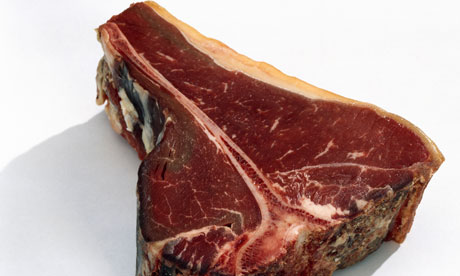No more excuses. The only defensible option is to go vegetarian
As the horsemeat scandal demonstrates, the global meat industry destroys the planet and leads to animal cruelty. If you care, there's only one thing for it

Most people eat meat, but recoil when they see what it entails. Photograph: Bon Appetit / Alamy/Alamy
Scores of questions, but no satisfactory answers. Did British ministers really know back in 2011 that horsemeat had entered domestic food supplies? Might the scandal now include donkeys? And what exactly was the role of an almost comically shadowy set-up called Draap Trading Ltd, which is owned by a trust registered in the British Virgin Islands?
While we're on the subject of the more light-footed aspects of modern capitalism, what of the fact that Findus – caught with horse flesh in its lasagne, and revealed to have outsourced the making of its Crispy Pancakes to the now-notorious French firm Comigel – is part-owned by a private-equity outfit commanded by one Lyndon Lea, a polo-playing gadfly once famed for a party in Montecito, California, where sushi was reportedly served on the bodies of half-naked women?
Accounts of his company's role in the recent Findus story are full of phrases such as "extensive cost-cutting", the sour tang of class and echoes of a lyric once sung by a long-lost indie rock band who went under the wonderfully apt name World Domination Enterprises: "Don't feel sick, cos someone's got to eat it."
As the scandal goes on, that very British sensitivity whereby cows and pigs can be killed and hacked to pieces, but no one must touch horses – or dogs – remains as curious as ever. No one has died, or even fallen ill; the possible entry of the veterinary drug bute into the scandal still looks likely to be a mildly worrying detail rather than the basis of any reasonable cause for mass panic. As far as I am aware, as the meat industry has grown both increasingly complex and ever-more unregulated, precious few of the voices now screaming about its excesses have ever sought to prise open its doors, question whether cutting back on inspection and regulation was such a great idea or wonder whether modern meat-eating might be leading us somewhere grim.
Nonetheless, something interesting is going on, as proved by a run of newspaper front pages. Last Thursday, for example, the Daily Mirror's headline was "the horse butchers", and the picture showed an anxious-looking man, seemingly cutting every last half-edible morsel from a chunk of flesh and bone. As with so much of the coverage of the current scandal, its visceral impact was not about whether the meat in question was from horses or cows, but the simple reality of the industrialised processes whereby sentient creatures are turned into what one former abattoir worker recently described in the Financial Times as "a block of frozen mush that's maybe 2ft by 2ft by 3ft". In an age when most people buy their meat from supermarkets and have rarely glimpsed a carcass, this points up one of 21st-century living's most messed-up aspects: the fact that most people eat meat, but recoil when they see what it entails.
At which point, an admission: I am a vegetarian, and I have not (knowingly) eaten meat since the mid-1980s. I stopped for two reasons: the simple realisation that I found killing animals for food objectionable, and a vague mess of thoughts bound up with what it was to be an archetypal 80s lefty. In the years since, I have barely uttered a word about it, mindful of the pieties that led George Orwell to malign certain people as "vegetarians and communists", and convinced that there are much more important things to shout about.
The clincher was the night I spent at the official Linda McCartney tribute concert at the Albert Hall, when the walls were covered in adverts for her less-than-interesting frozen foods – just relaunched, which is some feat of timing – and the musicians onstage exhorted everyone present to "go veggie". I cannot quite unpick what did my head in about this: something to do with a misplaced sense of priorities, coupled with a small "p" politics that seemed a little too twee and self-regarding.
But over the last decade or so, the case for vegetarianism has grown ever-more urgent, and unanswerable. A watershed came in 2008, when Rajendra Pachauri, the chair of the UN's intergovernmental panel on climate change, highlighted the links between meat consumption and environmental crisis, and advised anyone listening to "give up meat for one day [a week] initially, and decrease it from there." Now as then, the meat industry accounts for around a fifth of global greenhouse gas emissions, and is directly responsible for huge levels of deforestation. When it comes to wider arguments about sustainability, the arguments are just as stark. Sixteen years ago, a Cornell University study established that 800 million people could be fed with the grain used to fatten up US livestock; the majority of corn and soy grown in the world is now set aside for cattle, pigs and chickens.
Such is the rising noise focused on the meat industry: on the one hand, level-headed arguments about the future of the planet; and on the other, periodic spasms of outrage – as last happened in 2010, when the campaign group Animal Aid revealed the stomach-turning brutality that seemed to be routine at many English slaughter houses, a story which included one abattoir certified for the "humane slaughter" of organically reared cows, sheep and pigs.
But the horsemeat scandal is probably the first big story that joins the two elements together. Ever-rising food costs are what pushed retailers and manufacturers to source questionable meat, so as to keep prices low. Costs are going up partly because of increasing worldwide meat consumption, particularly in China and India, which pushes up the price not just of meat, but the foodstuffs used for livestock. The worldwide meat economy, then, is looking increasingly unaffordable – both financially and environmentally. And the upshot is obvious enough: if the world is going to eat ever-increasing quantities of meat, a lot of it will originate in places where rules are not respected, where animals are routinely brutalised and where what exactly is in those frozen blocks of mush is anyone's guess.
So, you cannot be a "flexitarian", and throw a couple of quorn products into your trolley and pretend that that makes everything OK.
Even if you have the money to buy organic meat at your local independent butcher, you will still collide with a couple of inescapable facts: that, as the Animal Aid revelations proved, organic butchery is no guarantee of ethical standards, and that getting our nutrition from meat-eating is unsustainably inefficient. If the personal is political, the only defensible option is to "go veggie". There: said it.

No comments:
Post a Comment